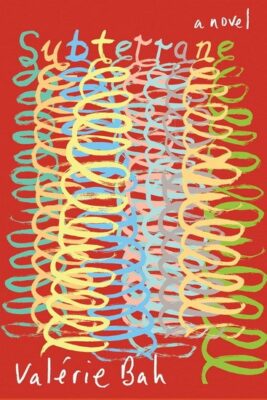Near the end of Valérie Bah’s Subterrane, Zeynab – an artist and resident of New Stockholm who has recently created a documentary about Cipher Falls, a low-income neighbourhood, and the creeping gentrification that threatens it – considers her relationship to Doudou Laguerre, an activist and resident of Cipher Falls: “[H]e knew how to translate himself to her … Doudou modulated his speech, used self-conscious language, and expressed emotions that seemed to come less from within than from a constructed self that conveyed what anyone might have felt going through what he did, lucid and resonant, able to be seen and understood by spectators.” Near the beginning of the book, before pitching the documentary to potential funders, Zeynab considers her outfit: “It’s boring as hell … but it will make her legible.”

Subterrane
Valérie Bah
Véhicule Press
$22.95
paper
200pp
9781550656671
Within this structure, authority figures like Ted (the white manager of a popular fast-food chain) and the New Stockholm Film Commission are peripheralized: they are narratively present but not centred. Subterrane doesn’t deny the impact of systemic violence on its characters – on the contrary, classism is at the heart of its conflict, as is anti-Blackness. But its lens is most passionately aimed at its Black queer and trans cast and their movement, legible or otherwise, not at the movement of their spectators. This is a book that hums with high-context, sublingual information, the kind that resists total comprehension joyfully and exactingly.
Perhaps unsurprisingly, the systemic injury the cast of Subterrane faces – anti-Blackness, classism, homophobia, transphobia, sexism – also includes gentrification. Subterrane’s antagonist, if there can be said to be one, is Defense Construction Incorporated, a construction company whose vaguely described project – “I heard they’re turning it into green space. Or is it condos?” – is quickly displacing Cipher Falls’ already precarious residents. While the crux of some chapters, in others gentrification is just a footnote, one that wraps itself quietly around everything. The repeated appearance of Ouroboros, a symbol of rebirth and renewal, is an echo of the book’s similarly overlapping and circuitous movement: narratives fuse and crash together like subatomic particles.
Ultimately, Bah’s characters are stuck in a web of kindred but not always synchronous experience: where they are in sync, consciously and unconsciously, is in a divided yet undividable effort to navigate structural violence, which, in Subterrane, takes many forms. They are on their own time. A plot summary, in its straightforwardness, would tell only half the story.mRb






0 Comments